Pathfinder: What is your name and what is your job title?
Anthony: “My name is Eric Anthony, I am the Choir director.”
Describe where you grew up.
“I grew up here, not in St. Louis County, but in St. Louis City.”
What was your childhood like, particularly when you were in elementary school?
“I come from a very modest background, but a loving family with lots of children. I have five older brothers and sisters and three younger brothers.
My father worked for many years at Central Hardware; my mother worked in schools, she wasn’t a teacher though, she was a Teacher’s Aid.
For a while, I went to my neighborhood school until I was tested in third grade to attend the gifted center, and at that point I attended one at Walnut Park Gifted Center. I left there and then went to Northwest High school in the St. Louis Public Schools for gifted as well.”
Describe a vivid memory you have in that part of your life.
“My brothers and sisters and I were allowed to play in the neighborhood all day.
When sundown came, my mother just came out to the front and called either my name or one of my brothers’ names, and we would come into the house.
There was no worry about someone snatching us or if one of us were to get in trouble or be in danger, that just didn’t exist when I was a child.”
What were some of your struggles then?
“For me, I was the really skinny kid in my family, I was the runt of the litter. Being a kid who was academically gifted, I was pushed academically beyond my grades.
I was in high school at 12, so I was really the kid in high school. That didn’t really work to my favor because I was scheduled to have gym seventh period, and at my high school, seventh period was the gym class for the football players.
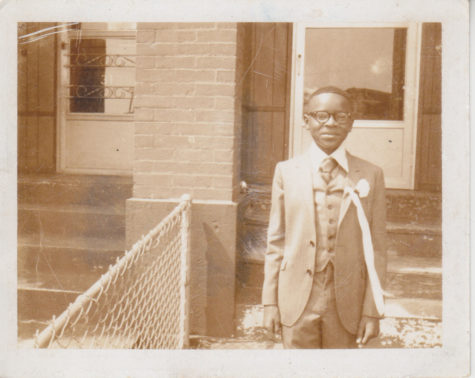
Eric Anthony at 12 years old in the year of 1969.
It was an easy mistake because there was another young man in my school who I knew for many years also named Eric Anthony, and he was a football player, but our names and student numbers got mixed up, so I was scheduled to have gym seventh hour with the football team and he was not.
If you can imagine playing basketball with the football team, that was not fun. That was a minor struggle, but it was kind of fun too.”
What what it like entering your teenage years?
“Entering my teen years, I had a couple of very close friends from both school and church, and my neighborhood that took really good care of me, and I did so as well, so much so those are still my friends now even though I’m almost 60.
We still talk regularly, we share our lives, I’ve gone to many weddings, and they’ve come to many concerts.”
In what ways were your adolescent years different from your younger childhood?
“My adolescent years were filled with the decision that I was going to commit to study music seriously, [Whereas] my childhood was a matter of enjoying music and learning to be a pretty good pianist.
In the adolescent years, I had to decide, and that is something most people don’t know, that if you want to be a musician, you have to make that commitment fairly early. I had to make that commitment late, though I was 12.
That just meant that I had to practice a whole lot, and that exposed me to a whole different world, a world of classical music and all that it presents at a very young age.”
Who was someone who impacted your life during that time period?
“A very fine teacher of mine named Bertram Ward, was a classical pianist who had recently moved to the St. Louis area and at that time found a job at the St. Louis Community school.
I was a young whippersnapper pianist who thought that I was God’s gift, and he put his hand on my shoulder and said, ‘You know, you have the talent, you have the capability, but you need to focus on the work.’
He took it very seriously with showing me how to focus on the work and looking at the detail, exposing me to a lot of stuff like the St. Louis Symphony, and in those days, Mark Twain Summer Institute, where I took Music Theory as a sophomore, junior and senior at Washington University on Saturday mornings.
He just opened up my life and world to classical music intensely.”
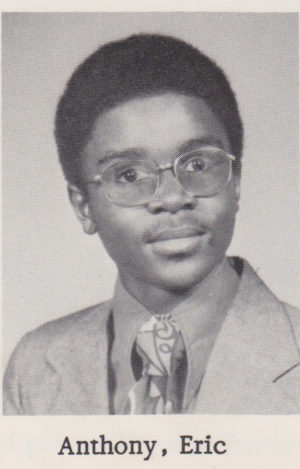
Senior pictures, Eric Anthony, Fall of 1973.
Describe some of your most vividly remembered memories in your teenage years.
“I’m a real family guy. My family, not a lot of money, but a lot of love and a lot of ‘Let’s spend time together.’
It echos in my adult life. My brother lives downstairs, and he is my neighbor and I wouldn’t want it any other way because I’m so used to having my family around me.
My teenage years will always be remembered of me spending time with family, for family, doing things with my older brothers and sister and enjoying them and our lives together.”
How did your transition into adulthood differ from all the other transitions you’ve been through?
“I hit things a little bit earlier than everybody because I graduated from high school very young, when I was 16 years old.
I wanted to attend Oberlin College because one of my older brothers had gone there for the summer enrichment program, and he came back with such great stories that I just knew that’s where I wanted to be.
When it came to undergraduate school, my parents said very wisely, “You are far too young to leave St. Louis. You’re graduating young; we’re not going to let you go away to school,” so I went to a junior college and I studied with Professor Ward at Flo Valley Community college. It was the best two years because I really got to grow up.
When I had the opportunity to go to a Music Conservatory in Baltimore, I was prepared. At 18 years old, I was old enough and mature enough. That wouldn’t have been the case when I was a high school senior because I was just way too young.”
What did you decide to do directly after school?
“Directly from undergraduate school, I went to graduate school.
I did two years at Flo Valley, three years at Johns Hopkins Peabody Conservatory in Baltimore, and then I decided to go to Indiana University School of Music.”
How did your love life progress through adulthood?
“Love life for me kind of comes and goes, simply for me because of that early commitment to music.
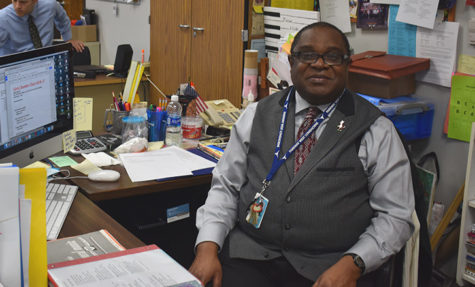
Choir Director Eric Anthony works to complete his lesson plans for the day.
I knew very young that I was going to be a musician and that would have to be my first love. I’ve had people that I’ve loved growing up, but they understood they were always second place to the music. Always.
I’m happily single, and the thing that I found for me that I kind of knew all along was that the teaching of music is where my heart is, and that’s really first in my life.
I do a lot of things musically, I accompany people, I know quite a few people in the African American Church community and have played for churches since nine years old. I have been an assistant choral conductor and substitute at the Symphony and I have, also, taught at every level from preschool through university.
The thing I love, though, is finding a school and getting there every morning to see some kids and share the passion.”
What was a past “bad” decisions that changed your life?
“A bad decision for me was after graduate school, I came back to St. Louis for a while, and then I went into the Marine Corps; that’s not the bad decision.
The bad decision was spending several years without the passion of music.
I was given permission to participate in music while I was in the Marine Corps, which truly opened up some doors for me, but when I got out of the Marine Corps I thought I was going to go into business.
I was going to go the usual route of most junior officers in the military, which means you get out of the military and wind up with a job at a major corporation.
I’ve had a couple of those jobs, and they’re awful and boring. I’m not the office guy, I can’t do 9 a.m. to 5 p.m. in an office. I tried those jobs after the Marine Corps, but it just didn’t work for me. I wasn’t called to do that, I was called to do something musically and the office thing wasn’t me. The leadership thing wasn’t a problem; it was not having the music piece in my life.”
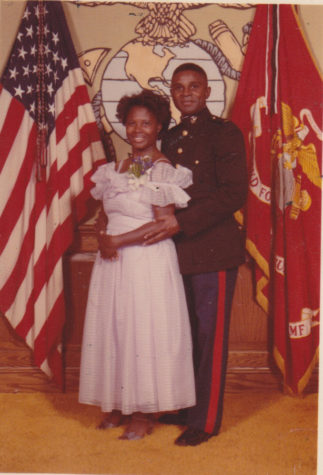
Eric Anthony stands beside Mittie Gray at the Marine Corps Ball, Nov. 10, 1984 in Camp Lejeune, NC to celebrate the Marine Corps birthday.
What did you specialize in in the Marine Corps?
“In the Marine Corps, I was what’s called a Disbursing Officer, which is the man who handles money, pay and leave.
I was the guy that held the money, and I did spend a number of months 120 miles below the North pole with $3 billion in cash, which I was responsible for.
Of that 3 billion, I was responsible for that amount. Some of that, of course, went to the guys who were there during some war games that I participated in. The money and receipts have to be accounted for when you come back to the states.”
What’s some advice you would want your children and students to know in the future to help further them in their own success and recoverment in their own struggles?
“The biggest lesson is don’t take yourself too seriously.
Use time wisely, and the older I get, I would say really spend time with your friends and love your friends. Appreciate the time you have with your friends because it goes by so quickly.
You don’t want to be a youth when you’re 35 and 40. When you are 15, 16 and 17, do those things of which are appropriate for a 15,16 and 17 year old kid and discover the world, so that you don’t have to do it when you are 35, 45, 55 or 65.”


![Sophomore Aleix Pi de Cabanyes Navarro (left) finishes up a soccer game while junior Ava Muench (right) warms up for cross country practice. The two came to Parkway West High School as exchange students for the 2025-2026 school year. “The goal for the [exchange] program is to provide opportunities for both Parkway students and our international exchange students to learn about other cultures, build connections and become confident, capable, curious and caring — Parkway’s Four C’s — in the process,” Exchange Program Lead Lauren Farrelly said.](https://pwestpathfinder.com/wp-content/uploads/2025/10/Feature-Photo-1200x800.png)

![Gazing across the stage, sophomore Alexis Monteleone performs in the school theater. The Monteleone family’s band “Monte and the Machine” has been releasing music since 2012, but Alexis started her own solo career in 2024 with the release of her first single, Crying Skies. “My whole family is very musical, [and I especially] love writing [songs with them],” Monteleone said.](https://pwestpathfinder.com/wp-content/uploads/2025/09/DSC7463-1200x798.jpg)
![Amid teaching a lesson to her AP Calculus BC class, Kristin Judd jokes alongside her students in their funny remarks. Judd has always enjoyed keeping the mood light in her classroom, along with on the volleyball court. “[I enjoy] that side talk where you see [or] overhear a conversation and chime in, or somebody says something funny,” Judd said.](https://pwestpathfinder.com/wp-content/uploads/2025/09/image-1200x730.jpg)
![Eyeing the ball, junior Ella McNeal poses for her commitment pictures at Clemson University. McNeal’s commitment comes after months of contact with top Division 1 soccer programs. “ It has taken a lot to get to where I am, but I know that [what] I've already been through is just the beginning, and I can't wait for what is to come,” McNeal said.](https://pwestpathfinder.com/wp-content/uploads/2025/09/IMG_4926-1200x900.jpeg)

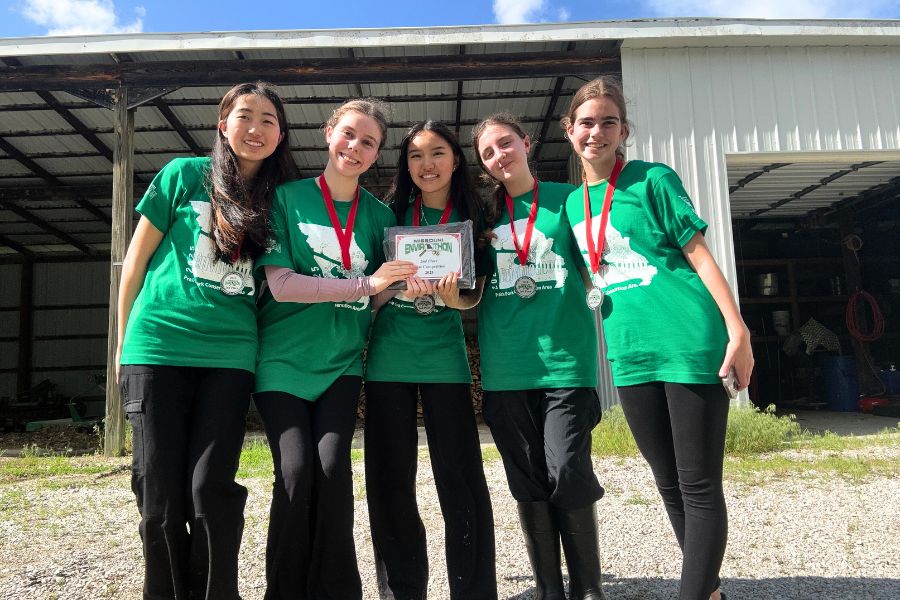
![Senior Adam Zerega stands with senior Dexter Brooks by farm equipment. Zerega often worked with friends and family on his farm. “I've been able to go to my family's farm since I was born. I [spend] at least three weekends a month [on the farm], so I'm there all the time,” Zerega said.](https://pwestpathfinder.com/wp-content/uploads/2025/04/IMG_4872-1200x900.jpg)
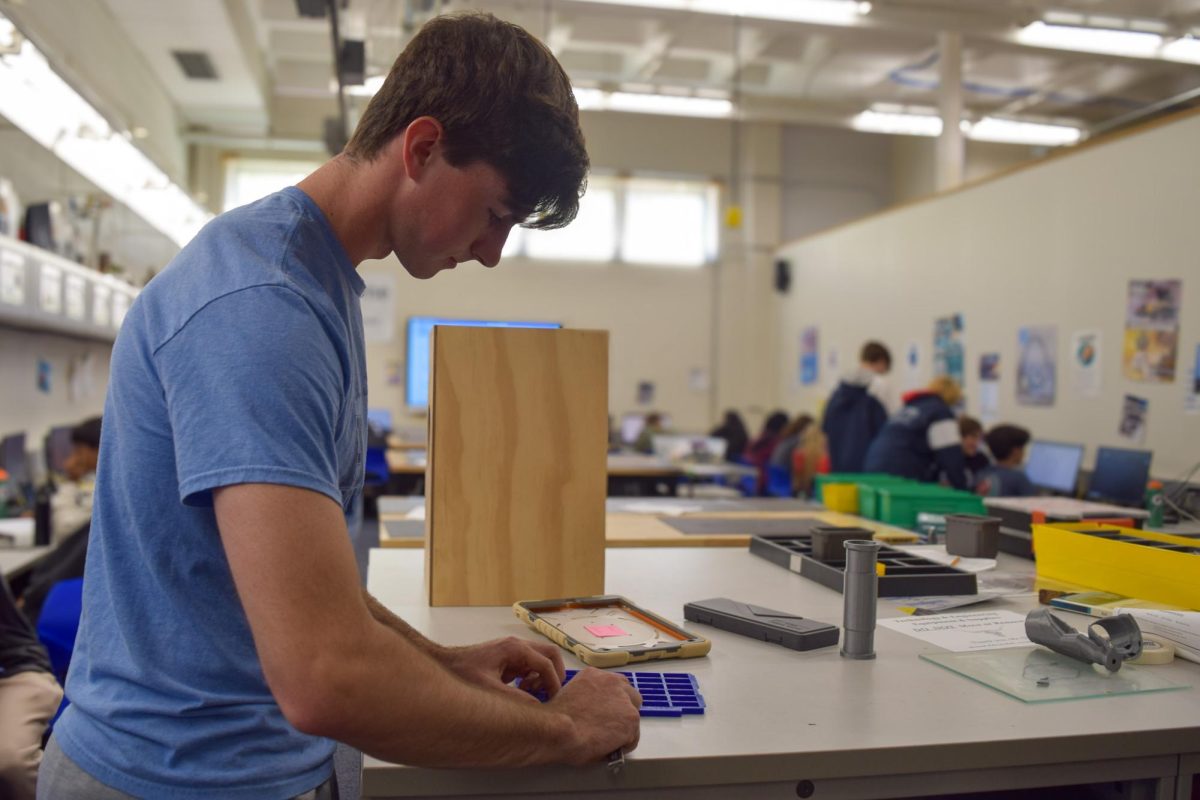
![Phage grown by senior Rio Naghibi Harat sit in petri dishes. Through Webster University, Naghibi Harat was given the opportunity to develop phage as a potential remedy for tuberculosis. “Phage are everywhere. I got mine from a soil sample. I'm not kidding; I picked [it] up from dirt. They're harmless, unless you code them to do something, and they can evolve. Virus antibiotics can't. They're one solid molecule. A strain of this bacteria [can evolve] that is resistant to [a] particular drug, [but] phage will evolve with the bacteria. They can see the changes, and they can be the change,” Naghibi Harat said.](https://pwestpathfinder.com/wp-content/uploads/2025/04/Flag-2.png)
![Leaning on the podium, superintendent Melissa Schneider speaks to Parkway journalism students during a press conference. Schneider joined Parkway in July after working in the Thompson School District in Colorado. “My plan [to bond with students] is to get things on my calendar as much as possible. For example, being in [classes] is very special to me. I am trying to be opportunistic [meeting] kids [and] being in [the school] buildings. I have all the sports schedules and the fine arts schedules on my calendar, so that when I'm available, I can get to them,” Schneider said.](https://pwestpathfinder.com/wp-content/uploads/2025/09/IMG_5425-1200x943.jpeg)

![Leaping through the air, senior Tyler Watts celebrates his first goal of the season, which put the Longhorns up 1-0 against the Lafayette Lancers. Watts decided to play soccer for West for his last year of high school and secured a spot on the varsity roster. “[Playing soccer for West] is something I had always dreamed of, but hadn’t really had a good opportunity to do until now. It’s [really] fun being out [on the field], and I’m glad I decided to join the team. It’s just all about having fun with the boys and enjoying what time we have left together,” Watts said.](https://pwestpathfinder.com/wp-content/uploads/2025/09/DSC_1951-1200x855.jpg)

![Junior Fiona Dye lifts weights in Strength and Conditioning. Now that the Trump administration has instituted policies such as AI deregulation, tariffs and university funding freezes, women may have to work twice as hard to get half as far. "[Trump] wants America to be more divided; he wants to inspire hatred in people,” feminist club member and junior Clara Lazarini said.](https://pwestpathfinder.com/wp-content/uploads/2025/05/Flag.png)
![As the Trump administration cracks down on immigration, it scapegoats many immigrants for the United States’ plights, precipitating a possible genocide. Sophomore Annabella Whiteley moved from the United Kingdom when she was eight. “It’s pretty scary because I’m on a visa. When my visa expires next year, I’m not sure what’s going to happen, especially with [immigration] policies up in the air, so it is a concern for my family,” Whiteley said.](https://pwestpathfinder.com/wp-content/uploads/2025/05/DSC_0077-7copy.jpg)
![Shifting global trade, President Donald Trump’s tariffs are raising concerns about economic stability for the U.S. and other countries alike. “[The tariffs are] going to pose a distinct challenge to the U.S. economy and a challenge to the global economy on the whole because it's going to greatly upset who trades with who and where resources and products are going to come from,” social studies teacher Melvin Trotier said.](https://pwestpathfinder.com/wp-content/uploads/2025/05/MDB_3456-1200x800.jpg)

![Pitching the ball on Apr. 14, senior Henry Wild and his team play against Belleville East. Wild was named scholar athlete of the year by St. Louis Post-Dispatch after maintaining a high cumulative GPA and staying involved with athletics for all of high school. “It’s an amazing honor. I feel very blessed to have the opportunity to represent my school [and] what [it] stands for,” Wild said.](https://pwestpathfinder.com/wp-content/uploads/2025/05/unnamed-6-1200x714.jpg)
![Red, white and blue, the American flag holds the values of our democracy. The fight that we once endured has returned, as student journalists and senior correspondents across the country are losing their voices due to government control. “[Are] the White House and [the] government limiting free speech [and] freedom of the press? Yes [they are],” chief communications officer of the Parkway School District and former journalist Elisa Tomich said.](https://pwestpathfinder.com/wp-content/uploads/2025/03/Untitled-design-14.jpg)

Trina Smith • Apr 17, 2024 at 6:27 am
How do we contact the Great and Gifted Mr. Eric Anthony?
Skyla Faber • Mar 7, 2017 at 9:56 am
I loved getting to know more of one of my favorite teachers. Definitely put a smile on my face!
Angee Keller • Mar 6, 2017 at 6:57 pm
I really enjoyed this. I don’t know Mr. Anthony but now I know a lot about him. Going into high school at the age of 12…WOW!
Cathy Aalfs • Mar 6, 2017 at 2:41 pm
Parkway West is lucky to Mr Anthony!